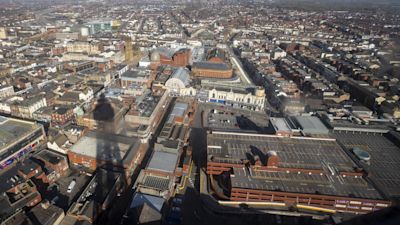How Blackpool is trying to grapple with its drug crisis

ITV News North of England Reporter Hannah Miller reports on Blackpool's escalating drug crisis
Blackpool is known for its ballroom, its tower, the pier where many a happy family holiday was spent. It is also gaining a reputation for being at the top of the league tables no one wants to win.
On Tuesday it was confirmed that Blackpool has the highest drug death rate in the country for yet another year. The news came as no surprise to police and drug workers on the front line, who are fighting against a multitude of factors to turn the tide in the town.
Lancashire Police were among the first to trial a scheme called ADDER, where police and treatment services come together to try to stop the vicious cycle of drug addiction by targeting top level criminals, and simultaneously getting users the support they need.
It is being expanded to cities across the country, with the hope that in the coming year the town will fall down the league table of drug deaths. Lives could be saved.
The government also hopes that an emergency overdose treatment called naloxone will make a difference in moments when lives are at risk.
On Tuesday, the Department for Health and Social Care announced they will consult on making it available for police and paramedics to carry - in response to the rise in deaths fuelled by opioids like heroin and methadone.
It’s a move that is welcomed in Blackpool, where at the moment only accredited drug workers are allowed to administer the potentially life-saving medicine, though some point out there’s also a need for services to stop the addiction in the first place.
Further up the coast, at a community centre in Morecambe, recovering addicts support each other through the ups and downs of getting clean.
Such is the demand that local organisation Well Communities opened up a new facility this year - and still they could use more space.
It was founded by David Higham, himself a recovering addict, and has grown to offer shared housing where people can get back into a more ‘normal’ life routine.
David says many of the problems he sees are ultimately down to poverty.
Some of the rise in deaths has been put down to the ageing of the population born in the 1970s, the so-called ‘Generation X’ who have consistently had the highest rates of drug misuse over decades.
But for young people in coastal towns, drugs have become easy to find.
'I’m sure as I can continue in my recovery then I’ll say it proudly – I’m a recovering addict'
Jake is 22 and started using drugs at parties, before the suicide of his uncle tipped him into cocaine and alcohol addiction.
Jake has been in recovery since June and is finding his inner strength. He wants to avoid the fate of his uncle, and is throwing his energy into his recovery plan.
Well Communities was there for him in the moment when he finally realised he needed help.
For 4,561 people last year, support couldn’t reach them when they needed it most.